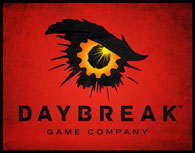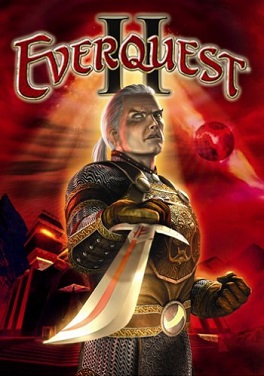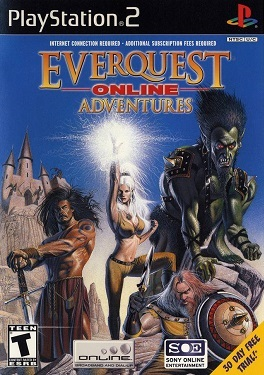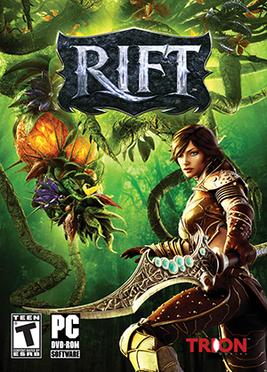
EverQuest is a 3D fantasy-themed massively multiplayer online role-playing game (MMORPG) originally developed by Verant Interactive and 989 Studios for Windows. It was released by Sony Online Entertainment in March 1999 in North America, and by Ubisoft in Europe in April 2000. A dedicated version for Mac OS X was released in June 2003, which operated for ten years before being shut down in November 2013. In June 2000, Verant Interactive was absorbed into Sony Online Entertainment, who took over full development and publishing duties of the title. Later, in February 2015, SOE's parent corporation, Sony Computer Entertainment, sold the studio to investment company Columbus Nova and it was rebranded as Daybreak Game Company, which continues to develop and publish EverQuest.

Star Wars Galaxies (Galaxies) was a Star Wars- themed massively multiplayer online role-playing game (MMORPG) for Microsoft Windows, developed by Sony Online Entertainment (SOE) and published by LucasArts.

Daybreak Game Company LLC is an American video game developer based in San Diego. The company was founded in December 1997 as Sony Online Entertainment, a subsidiary of Sony Computer Entertainment, but was spun off to an independent investor in February 2015 and renamed Daybreak Game Company. On December 1, 2020, Daybreak Game Company entered into an agreement to be acquired by Enad Global 7.

Brad McQuaid was an American video game designer who was the key designer of EverQuest, a highly successful massively multiplayer online role-playing game (MMORPG) released in 1999. He later co-founded Sigil Games Online where he served as CEO and Executive Producer of Vanguard: Saga of Heroes until Sony Online Entertainment's acquisition of Sigil Games Online in May 2007. On July 6, 2012, SOE announced the re-hiring of McQuaid to continue his work on Vanguard. On January 13, 2014, McQuaid announced his role of Chief Creative Officer at Visionary Realms, Inc. for the PC MMORPG, Pantheon: Rise of the Fallen.

Infantry, also known as Infantry Online, is a multiplayer combat video game. Originally released in 1999, the game was taken offline by Sony Online Entertainment and the servers shut down in March 2012. The Infantry community subsequently took control of the game and re-launched it independently at freeinfantry.com.
Sigil Games Online, Inc. was a computer game developer based in Carlsbad, California founded in January 2002 by Brad McQuaid and Jeff Butler, key development team members who created EverQuest, the most popular massively multiplayer online role-playing game before World of Warcraft. McQuaid and Butler left Sony Online Entertainment (SOE), the publisher of EverQuest, and formed Sigil Games Online to develop "the next big thing". McQuaid told to the video game website IGN at the time that he was happy to assemble a team of MMORPG developers and to focus on making similar project, as opposed to his work in SOE. Sigil released their only game Vanguard: Saga of Heroes on January 30, 2007 after several well publicized delays and a last minute switch from publishing with Microsoft to publishing again with SOE. In May 2007, SOE acquired key assets of Sigil Games Online. As a result, SOE now owns Vanguard: Saga of Heroes, described as Sigil's "tent pole property".

EverQuest II is a 3D fantasy massively multiplayer online role-playing game (MMORPG) originally developed and published by Sony Online Entertainment for Microsoft Windows PCs and released in November 2004. It is the sequel to the original EverQuest, released five years earlier, and features updated graphics and more streamlined gameplay compared to the previous entry, as well as an abundance of voice acting with contributions from actors such as Christopher Lee and Heather Graham. In February 2015, Sony Online Entertainment's parent corporation Sony Computer Entertainment sold it to investment company Inception Acquisitions, where it continues to develop and publish the game under its new name, Daybreak Game Company.

EverQuest Online Adventures (EQOA) was a 2003 3D fantasy massively multiplayer online role-playing game (MMORPG) for the PlayStation 2. The game was part of the EverQuest franchise before being shut down on March 29, 2012, after nine years of operation.

Vendetta Online is a twitch-based, science fiction massively multiplayer online role-playing game (MMORPG) developed by Guild Software for the operating systems Android, Linux, Mac OS X, iOS, and Microsoft Windows. It uses the NAOS game engine, a fully real-time flight model and combat system, to offer first-person/third-person shooter-style player versus player and player versus environment battle action against the backdrop of a massively multiplayer universe. Vendetta Online shipped as a commercial MMORPG in November 2004 with a subscription-based business model, although it has been running continuously since April 2002. Vendetta Online is available to play across a wide array of platforms, including the Oculus Rift virtual reality display, allowing all users to directly interact in a single, contiguous galaxy. It is also notable for its twitch combat and fidelity to real physics.
Guild Software is a small independent computer game developer located in Milwaukee, Wisconsin (USA) founded in 1998. Guild Software is best known for creating Vendetta Online, a first-person MMORPG that uses their in-house NAOS game engine. In 2009, the studio was voted a Reader's Choice Award for Favorite Company by MMOsite.com.

Vanguard: Saga of Heroes was a high fantasy-themed massively multiplayer online role-playing game (MMORPG) developed by Sigil Games Online and published by Sony Online Entertainment (SOE). The game was released on January 30, 2007 and initially sold around 242,000 copies, while the number of active subscriptions was estimated to be around 130,000, to drop in the next months to about 40,000. In May 2007, Sony Online Entertainment acquired key assets from Sigil Games Online, including all rights to Vanguard.
The history of massively multiplayer online games spans over thirty years and hundreds of massively multiplayer online games (MMOG) titles. The origin and influence on MMO games stems from MUDs, Dungeons & Dragons (D&D) and earlier social games.

Legends of Norrath was an online digital collectible card game by Sony Online Entertainment. Legends of Norrath is based on the massively multiplayer online role-playing games EverQuest and EverQuest II. Legends Of Norrath was playable from within either of the two games, or via a stand-alone client.
Free Realms was a massively multiplayer online role-playing game (MMORPG) developed by Sony Online Entertainment (SOE) set in a fantasy-themed world called Sacred Grove. The game was first released on April 28, 2009 for Microsoft Windows. Versions for Mac OS X and PlayStation 3 followed in subsequent years. The game was free-to-play with leveling restrictions, with access to additional content available through a membership fee. The game allowed the player to fight, interact with other players, take up jobs, and more.

Rift is a fantasy free-to-play massively multiplayer online role-playing game developed by Trion Worlds. Rift takes place within the fantasy world of Telara. Two competing factions, composed of a selection of races and classes, battle each other and the enemies who emerge from dynamic "rifts". The game was released in March 2011. A port of the game, called Rift Mobile, was released for Android on January 25, 2012.
Kunlun Group or their alternative name KoramGame, is a Hong Kong software developer and publisher.

PlanetSide 2 is a free-to-play massively multiplayer online first-person shooter (MMOFPS) game developed by Toadman Interactive. The game supports battles with thousands of players and incorporates modern first-person shooter mechanics. Six infantry classes and multiple vehicles available to players, allowing them to interact in combined arms warfare on the battlefield. PlanetSide 2 is a reimagining of PlanetSide and chronicles the efforts of the same three factions in their fight for control of the alien planet Auraxis.

Trion Worlds was an American video game developer. It focused primarily on MMOs, particularly of the MMORPG and MMORTS genres. The company was founded in 2006 by Lars Buttler and Jon Van Caneghem, who had each previously worked for NCSoft and left in 2009 to join Electronic Arts.
ForgeLight is a proprietary MMO game engine developed and used by Daybreak Game Company. The engine has been used for Free Realms, Clone Wars Adventures, PlanetSide 2, Landmark, EverQuest Next, H1Z1: Just Survive, H1Z1: King of the Kill. The engine was nominated for the 2013 Game Developers Choice Awards Best Technology award.
Landmark was a massively multiplayer online role-playing game developed and published by Daybreak Game Company for Microsoft Windows. The game's original name was EverQuest Next Landmark, but was switched to Landmark in March 2014. The original purpose for EverQuest Next Landmark was mainly as a player content creation tool for EverQuest Next. Landmark was released in June 2016, and was playable until the servers were shut down in February 2017.













